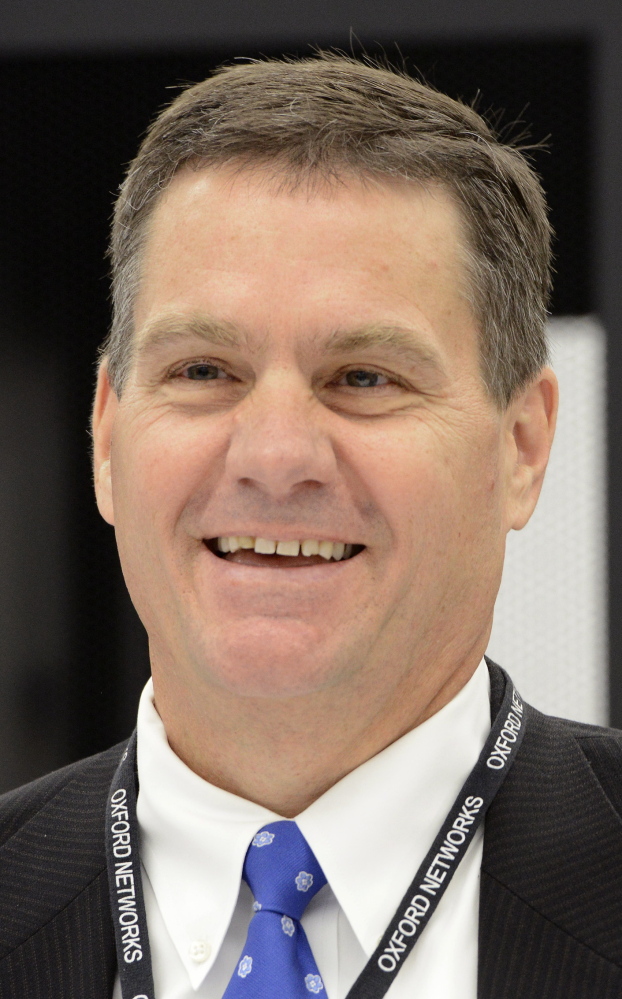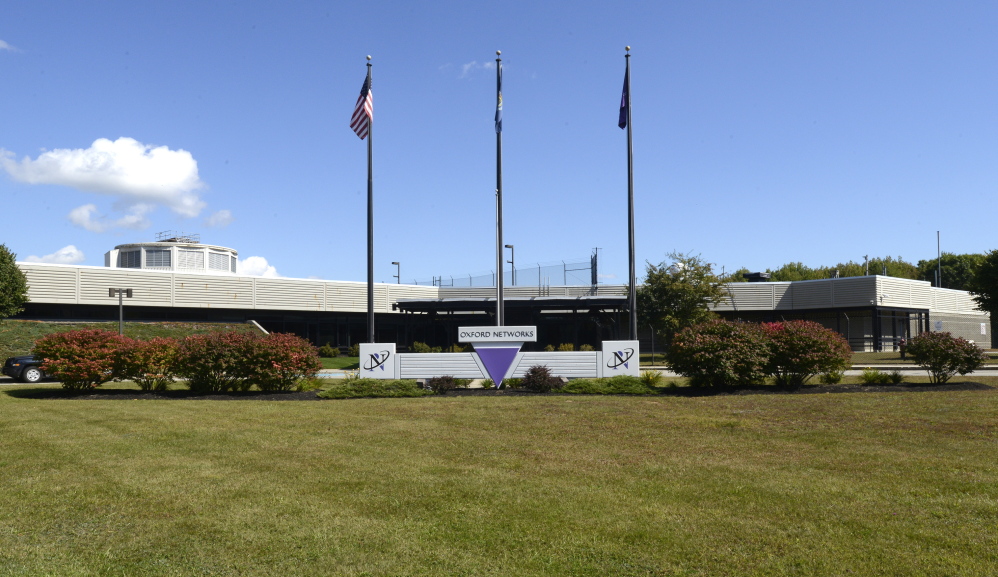Drive onto the former naval air base in Brunswick, past a permanently parked P-3 Orion military surveillance plane, through a gate in a barbed wire-topped fence and you’ll come to a bunker of a building that is now the largest data center in northern New England.
Oxford Networks unveiled its newly expanded data center, which provides data storage, cloud computing and disaster recovery services to customers around the country, at a ribbon-cutting ceremony Wednesday that included remarks from CEO Craig Gunderson and Maine Gov. Paul LePage.
The $6 million expansion added 7,000 square feet of space to Oxford Networks’ existing data center. The new room is bright and cool, its white walls and tile floors reflecting light from multiple rows of LED ceiling fixtures as air conditioners prevent the servers from overheating. The room has 50 matte black racks, but could hold 210, which Gunderson hopes will quickly be filled with servers, humming away as they transmit and store customer data – everything from emails to videos. Current customers include Bowdoin College, Maine Community Health Options, Maine Oxy and Polar Beverages.
The ultra-secure, 52,000-square-foot facility was built for NATO and served as the naval air station’s command and control center, tracking and analyzing the data sent back from the anti-submarine surveillance aircraft flying over the North Atlantic. The building’s bunker-like design and built-in disaster recovery elements made it a perfect fit for a data center when the Brunswick Naval Air Station was decommissioned in 2011 and handed over to the Midcoast Regional Redevelopment Authority.
“We think this facility is a great asset for Maine, one that in combination with a number of other attributes can drive economic development efforts,” Gunderson said.
LePage said Oxford Networks is a company showing the way forward for Maine’s high-tech industries.
“This is an example of a company that is in the 21st century that is moving Maine forward and is not only able to conduct its business here in Maine, but throughout our country and the world,” he said.
Oxford Networks was founded in 1900 as Oxford County Telephone and Telegraph Co. For most of the next century, it provided basic telephone service in western Maine. But the company’s board realized in the late 1990s that to survive, the company would need to expand its telecommunications services and its geographic reach. The company now owns a fiber-optic backbone that extends between Bangor and Boston and offers high-speed Internet services to business and residential customers. It employs 120 people.
Data storage and cloud computing services currently produce between 5 and 10 percent of the company’s revenue, “but we’re going to fix that,” Gunderson said in an interview after the event. His goal is to grow that share to more than 25 percent during the next couple of years, he said. But he hopes growth in demand for Oxford’s services far exceeds that.
As the amount of data and digital material consumed by businesses increases in the coming years, there will be a concurrent rise in demand for centers that can store that data, according to a September 2013 report from GE Capital. Between 2012 and 2016, the square footage of third-party data centers – like that of Oxford Networks – needs to increase annually at 15.1 percent to meet the anticipated need, according to the report.
Bowdoin College in Brunswick has completely outsourced its data center to Oxford Networks’ secure facility. The college’s former data center was in the cramped basement of a 100-year-old building on campus, which was not as secure as Mitch Davis, the college’s chief information officer, would have liked. It was also susceptible to disasters such as flooding.
“We were running out of space,” Davis said.
Bowdoin looked at building its own data center, but that plan proved cost prohibitive, Davis said. That’s when the college began looking at outsourcing its data storage and, after a search around the country, discovered that its best option was just down the road at the former naval base, now called Brunswick Landing. Oxford’s data center is now home to nearly 300 terabytes of Bowdoin’s data – everything from its library catalog to the football team’s practice videos – and 375 of the college’s servers. Outsourcing its data storage has made it easier to collaborate with other colleges and universities in the state, Davis said. A library partnership with Colby College in Waterville and Bates College in Lewiston is already underway.
“We’re looking at a lot of options we didn’t have available before,” Davis said. “Now with this partnership we hope we can do a lot of things in Maine and in Brunswick.”
Oxford Network’s expansion would not have been possible without an infusion of capital by Montreal-based private equity firm Novacap, which acquired Oxford Networks at the end of May for $50 million. Novacap also owns Host.net, a company with three data centers in Florida.
Francois Laflamme, Novacap’s senior partner, was in Brunswick on Wednesday. He said his firm’s acquisition of Oxford Networks and its data center will be a good bet if his predictions about the growth in demand for data center services is realized.
“We’re big believers that most businesses and enterprises will go into the cloud,” Laflamme said.
Send questions/comments to the editors.




Success. Please wait for the page to reload. If the page does not reload within 5 seconds, please refresh the page.
Enter your email and password to access comments.
Hi, to comment on stories you must . This profile is in addition to your subscription and website login.
Already have a commenting profile? .
Invalid username/password.
Please check your email to confirm and complete your registration.
Only subscribers are eligible to post comments. Please subscribe or login first for digital access. Here’s why.
Use the form below to reset your password. When you've submitted your account email, we will send an email with a reset code.